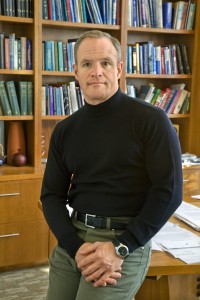Contact: Lynn Yarris (510) 486-5375, [email protected]
Jay Keasling, Berkeley Lab’s acting deputy director and CEO of the Joint BioEnergy Institute (JBEI), has been selected by the Biotechnology Industry Organization (BIO) to receive its first annual Biotech Humanitarian Award. Keasling, also a professor with the University of California at Berkeley, was recognized for his use of synthetic biology techniques to develop a simple and much less expensive means of making artemisinin, today’s most powerful anti-malaria drug. The synthetic biology technology behind this breakthrough can also be used to help produce the next generation of biofuels.

Jay Keasling, winner of the first Biotech Humanitarian Award, is the acting Deputy Director of Berkeley Lab, CEO of the Joint BioEnergy Institute, and a professor of chemical engineering and bioengineering with the University of California at Berkley
“Dr. Keasling embodies the high standard we have set for the Biotech Humanitarian Award in leading the development of breakthrough science that will greatly help reduce human suffering,” said Jim Greenwood, president and CEO of BIO. “Dr. Keasling’s work has the potential to save the lives of millions of people in the developing world who suffer from malaria, and also to address the global need for clean, renewable energy. We are thrilled to honor his work and present him as our inaugural Biotech Humanitarian honoree.”
Keasling was presented the Biotech Humanitarian Award during a keynote luncheon held on May 20, 2009 at the 2009 BIO International Convention in Atlanta, GA. The award includes a $10,000 prize to help support his work.
Artemisinin is the key component in artemisinin-based combination therapies (ACTs), which are the World Health Organization’s recommended first-line treatment for malaria. Currently, artemisinin is extracted from Artemsisia annua, the sweet wormwood tree, and manufactured through costly chemical synthesis. In the technique developed by Keasling and his collaborators, artemisinin is fermented via engineered microbes, such as yeast. Microbial-based artemisinin is expected to dramatically reduce the production time and cost of artemisinin for ACTs, making them far more accessible to the people who need them most. According to the World Health Organization, each year nearly 500 million people become infected with malaria, and nearly three million, mostly children, die from it.
“It is an honor to receive this recognition as biotech’s collective efforts hold a tremendous potential for addressing the world’s toughest challenges in new ways,” said Keasling. “It took incredible team effort to do the science that resulted in an affordable malaria therapy, and we will continue to work to bring this therapy online, while also pushing the boundaries of biofuels to reduce our need for fossil fuels.”
Dr. Keasling was selected the honoree by a distinguished panel of judges who evaluated nominations based on four criteria: impact on contemporary society; impact on future generations; contribution to the field of biotechnology; and level of innovation exhibited. BIO established the Biotech Humanitarian Award to recognize everyday heroes within the biotechnology community who have helped heal, fuel and feed the planet through their work in biotech.
said Dr. Joshua Boger, Immediate Past Chairman of BIO’s Board of Directors and CEO of Vertex Pharmaceuticals Incorporated, “Dr. Keasling’s work embodies all the principles of a biotech humanitarian and represents a paradigm shifting discovery, focused on fundamentally changing how we treat disease in the developing world. The translational nature of Dr. Keasling’s discovery and application holds enormous potential for the medical, industrial and agricultural fields of biotech. Dr. Keasling is a true biotech humanitarian as he has chosen to use his career to impact global health and direct the potential of biotech to improve humanity. I thank him for his hard work, and I am honored to present him with the inaugural Biotech Humanitarian Award.”
Keasling believes that the same synthetic biology techniques used to make the microbial-based artemisinin will be equally effective in the drive to produce a next generation of biofuels – carbon-neutral transportation fuels derived from plant biomass.
“Artemisinin is hydrocarbon and we built a microbial platform to produce it,” he has said. “We can remove a few of the genes to take out artemisinin and put in a different hydrocarbon to make biofuels.”
Producing the next generation of carbon-neutral biofuels is the primary mission of JBEI, one of three U.S. Department of Energy Bioenergy Research Centers. JBEI is a multi-institutional partnership led by Berkeley Lab and directed by Keasling.
Berkeley Lab is a U.S. Department of Energy national laboratory located in Berkeley, California. It conducts unclassified scientific research and is managed by the University of California.
Additional Information
A press release on the selection of Keasling as the first Biotech Humanitarian Award recipient can be viewed at http://bio.org/news/pressreleases/newsitem.asp?id=2009_0520_02
More information about the Biotech Humanitarian Award can be viewed at www.iambiotech.org/award
For more information about Jay Keasling and his research, visit his Website at https://keaslinglab.lbl.gov/wiki/index.php/Main_Page
For more information about JBEI visit the Website at http://www.jbei.org/